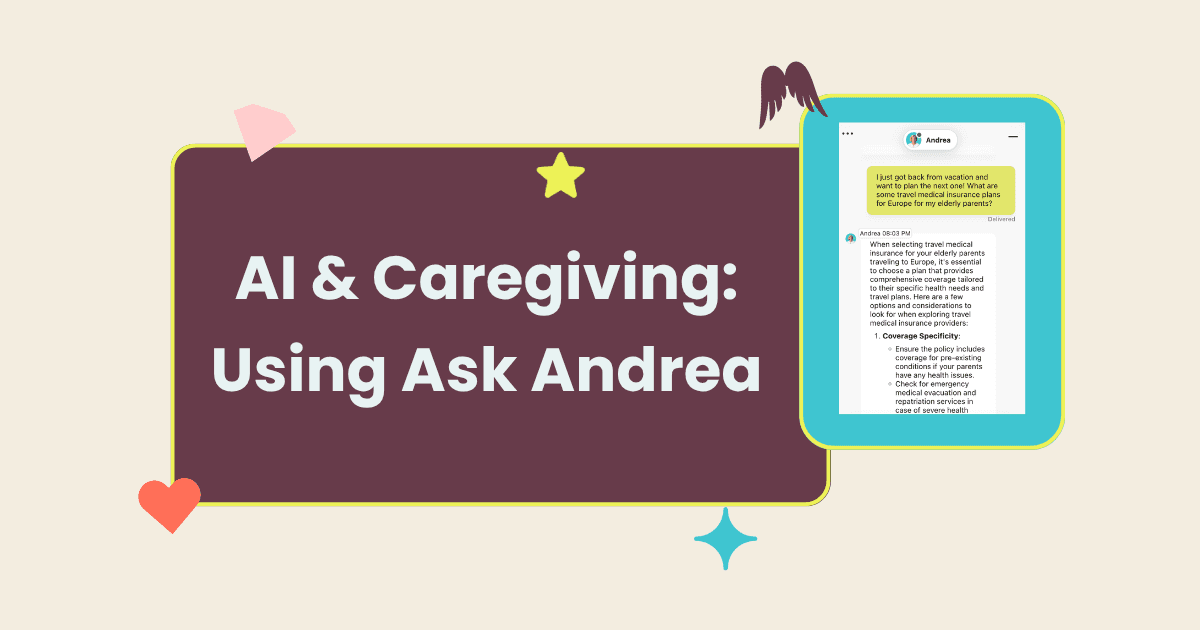Ask Andrea: Empowering Family Caregivers With AI
Whether caring for an aging parent, a partner with chronic illness, or a child with special needs, caregivers frequently find themselves navigating unfamiliar territory—reacting to challenges as they arise. That’s why HeroGeneration created Ask Andrea, a 24/7 AI-powered assistant designed specifically for caregivers like you.

Dr. Shruti Roy, D.O.
Published on July 21, 2025

Caregiving is often described as a labor of love, but it’s also a role filled with uncertainty. Whether caring for an aging parent, a partner with chronic illness, or a child with special needs, caregivers frequently find themselves navigating unfamiliar territory—reacting to challenges as they arise. The truth is, family caregivers often don’t know what they don’t know.
Each day brings new questions. “Is this medication interaction normal?” “Why is Mom more confused today?” “Am I doing enough?” These are real, urgent concerns. And most caregivers are navigating them alone, often in moments of stress or fatigue. Medical professionals are helpful—but they’re not always available when the questions come up. That’s why HeroGeneration created Ask Andrea, a 24/7 AI-powered assistant designed specifically for caregivers like you.
How AI Can Fill the Gaps Here’s how AI, including tools like Ask Andrea, can transform the caregiving experience:
Predictive Alerts and Early Warnings
AI can monitor health data (from wearables or smart devices) to identify subtle patterns and provide alerts before emergencies occur—such as dehydration, wandering, or sudden behavioral changes.
Guided Planning and Education
Using large datasets and real-time context, AI can provide personalized checklists, care tips, or medical guidance based on a person’s condition. It can also explain what symptoms to watch for next—arming caregivers with knowledge before a crisis hits.
Coordination and Routine Management
AI-driven tools can manage medications, appointments, and care schedules—minimizing human error and easing mental load. Some systems can even reorder medical supplies automatically or alert when a prescription is running low.
Emotional Support and Community Connection
Chatbots or AI assistants can offer daily check-ins, mood tracking, or suggestions to improve mental health. AI can also help connect caregivers to communities, local resources, and support networks they might not discover on their own.
By identifying gaps before they turn into problems, AI helps caregivers transition from a reactive mode to a proactive one. Instead of asking, "Why didn't I know this would happen?", caregivers can feel more confident and better equipped—both practically and emotionally. Caregiving will always require compassion, patience, and resilience. But with AI by their side, caregivers don’t have to walk the journey alone—or in the dark. The future of caregiving isn’t just about technology; it’s about empowerment.
Ask Andrea Video

About Dr. Shruti Roy, D.O.
Dr. Shruti Roy is a pediatrician and mom of three who spent years coordinating care for children in urgent care and emergency room settings. But when faced with managing the care of her own aging parents Shruti encountered firsthand the overwhelming gaps in caregiver support. Juggling her career, motherhood, and caregiving opened her eyes to how isolating and challenging this role can be, even for a medical professional. Today, Shruti is passionate about empowering families who are caring for loved ones across generations. She shares both medical insights and personal lessons learned from living this balancing act every day.
